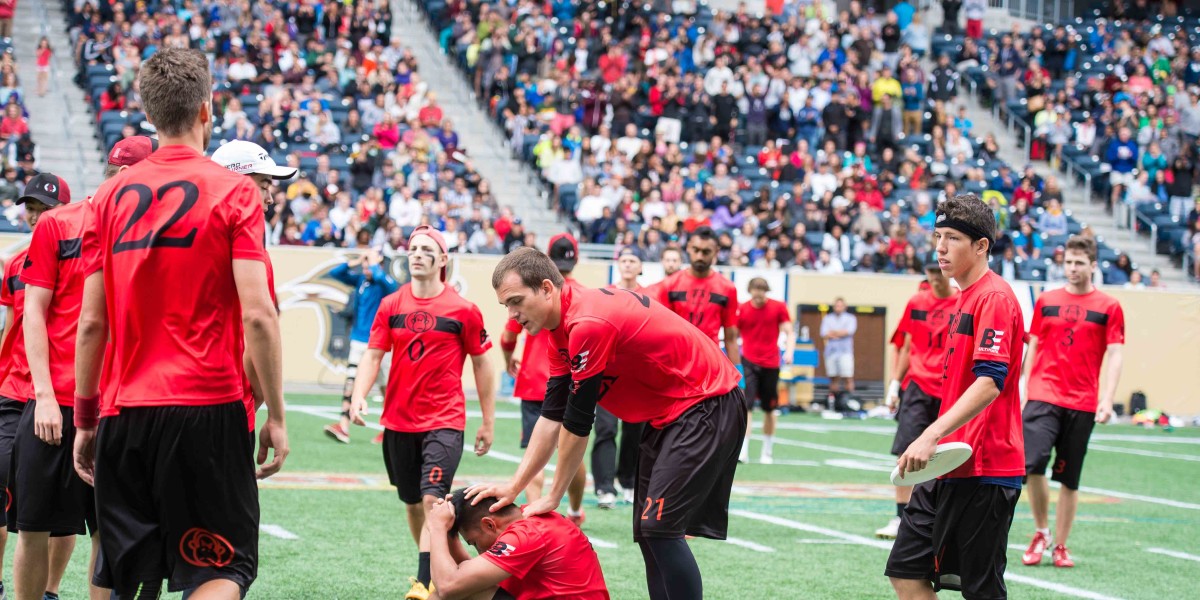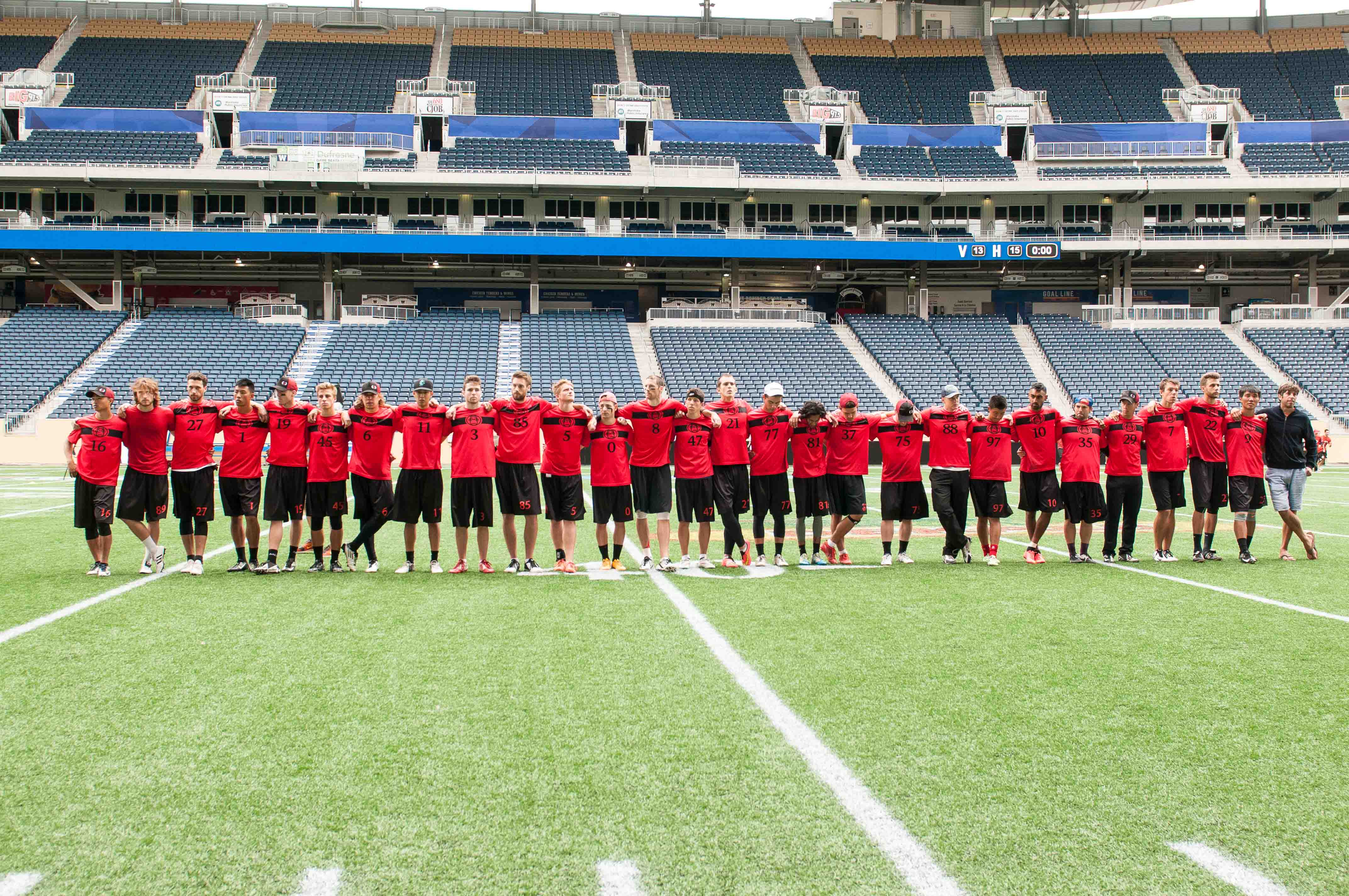
Canadian Ultimate Championships 2015
Three years ago, almost to the day, General Strike posted an article about their CUC experience: a close-fought, roller-coaster of a game in the final of the Canadian championship. And it was eye-catching because it raised a very powerful question for teams everywhere: how do you define success? It’s a simple question, but horrifying in its magnitude.
If you’re not successful, does that make you a failure?
It was a poignant article because we, Furious George, were the proverbial villains in that game. Winnipeg was on the verge of their fist-ever CUC win; we stood on the brink of what could have been our first-ever CUC loss. The prospect of losing that game — like a betrayal to everything Furious that had come before us, felt like a fate worse than death. Dreams and nightmares collided on the field.
In the end, by sheer desperate, panicked effort, we wrestled away a victory and clung to our relieved identity. On the other, bitter side of the divide, Winnipeg sat down and reflected. Even as we celebrated, I knew that one day, in an unavoidable, frightening future, I would have to face the same questions General Strike were forced to ask themselves. I wondered how I would handle it, and what my answers would be.
Last fall, at the end of the season, Furious George assembled in my living room to define our mission for 2015. It had been a painfully turbulent year, with the lull and the roster attrition following our campaign in Italy, the loss of Morgan Hibbert, and a limping, rookie-studded rebuilding effort culminating in a bittersweet season finale in Frisco, Texas. Everyone in the room was mentally exhausted, like they had been grinding gears longer than memory allowed. Ultimate had become some kind of surreal torment through which we built character without even knowing why.
Furious had, for a long time, defined itself by winning: it was the only metric of a season’s success. But we had not won in Italy, we had not won the MLU Championship, and we were a far cry from winning in Texas. It’s a dangerous mission statement to adopt, because the odds are stacked against you, and in a world where you can’t possibly guarantee your wins, what have you got when you lose? Who are you then? What’s left? It was a question we sat around the room trying to answer.
This year, we decided as a group to try to care more about the things we had in our power to control, as players and as a team. We cared about work ethic, because effort is something everyone has the power to give. We decided we cared about brotherhood and teamwork, because we can help each other achieve. We cared about thinking creatively, because we believed in exploring our talents and where they took us, instead of trying to shoehorn ourselves into preconceived molds.
Most importantly, we applied the idea of “what you can control” to every detail. Excellence was not going to be decided by wins. Excellence was something you achieved in practice, in the pursuit of the means instead of the ends. Every single drill and every single game, we repeated, “Focus on what you can control; focus on your job; let everything else fall into place.” Winning was valuable to us, but it no longer became the measure of who we were. The measure of success was not a score, but the outcome of an inner battle between our desire to do our best, and those things that would distract us therefrom.
It seems poetic that we met General Strike in the semi-finals this year. Now in their hometown, and they fought us tooth-and-nail in a 13-12 brawl, again knocking on the door of our mortality. Again, we walked away with the win, but the foreshadowing was there, as if an author had masterminded this entire story. But we walked away without anxiety or doubt, because although the score was close, the inner battle was not. We had performed well. We had played our roles reasonably well, and our opponents had played theirs phenomenally well. The score was something outside of our control.
We met GOAT in the final — a high-stakes rematch four years in the waiting. The story of the final, for me, is the story of our game plan. It is the result of several hours of analysis, and team meetings, and many, many practices and drills. It is a beautiful demonstration of what happens when teamwork crystallizes. Seven people at a time think of nothing other than their purpose on the field, and the sideline speaks as a hive-mind — the eyes, heart and brain of the team.
In the final point, with GOAT leading 14-13, GOAT runs out of open options. Fred Lam dives, deflecting a disc intended for Jeff Lindquist. It careens toward the sideline, catching the wind tunneling down the centreline of the stadium. It hovers, and turns away, sailing back into Lindquist’s open hands. Focus on what you can control; accept the things you cannot…. Shortly thereafter, Toronto won 15-13.
After the game, despite of hundreds of people chattering and cheering, the world felt dead and quiet. There was a sting of disappointment. I was disappointed by the implications of the score. I was disappointed by the loss of a 20-year-old legacy. I had expected this. I was braced for it.
What I had not expected was the conflicting pride. At first, it was confusing, but the longer I thought in the silence, the surer I was of it. The team had played well, by our measures, on our own terms. We had followed the plan. We had controlled everything in our power to control.
We had done everything right, and when the dice were cast, we lost. But the outcome is not what makes Furious George. Whatever it is, now or in the future, it should not be the divide between winning and losing. It’s something else.
When I looked to the crowd, previous generations of Furious came down from the stands to greet us. They shook our hands. The words on their lips were “congratulations.”









Comments Policy: At Skyd, we value all legitimate contributions to the discussion of ultimate. However, please ensure your input is respectful. Hateful, slanderous, or disrespectful comments will be deleted. For grammatical, factual, and typographic errors, instead of leaving a comment, please e-mail our editors directly at editors [at] skydmagazine.com.